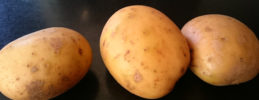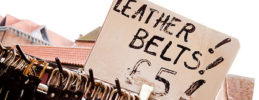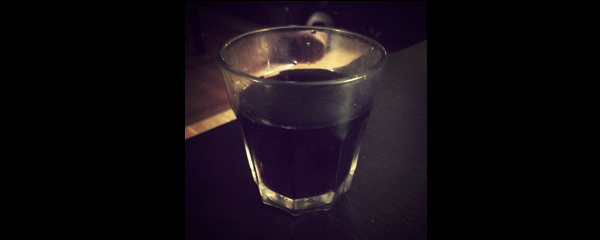
('Red in My Ikea Glass' © HeatherBie, 2013)
*
PILGRIMS, OR: ‘I Think We’re All Thinking About Lena’
by KATE SMITH
*
‘Pilgrims’, the story that opens Julie Orringer’s collection How to Breathe Under Water, is remarkable and satisfying in its own right, and, once you’ve read the whole collection, to re-read ‘Pilgrims’ is to hear not only the clarity of its own notes but something of those of the stories to come. Orringer knows, as did comedian Eric Morecambe, that it’s about hitting the right notes, in the right order.
The story starts in a car whose occupants are embarking on a journey. It’s Thanksgiving Day in New Orleans and ‘They were driving uptown to have dinner with strangers’. If, as first-time readers of this story, we’re in some sense pilgrims, then so, too, are the story’s subjects, on a kind of enforced pilgrimage, though they don’t really see it that way – literally, metaphorically, from here to there, from wellness into illness, from childhood to adulthood.
The opening of ‘Pilgrims’, with its reference to Thanksgiving, calls on the New World of 1620, when English settlers, or Pilgrims, built good relations with their Indian neighbours, or so the sanitised children’s history books tell us, and led eventually to a Thanksgiving celebration once the winter had come and gone. We’re in the car with Ella, a child from whose point of view this story is told, older sister to brother Benjamin, who’s wearing his Pilgrims costume, ‘yellow paper buckles taped to his shoes’. Their father drives in silence, and under her knitted hat, their mother is bald, her cancer rendering all four of them nearly mute with private fears, going mostly unsaid. The theme of Thanksgiving takes in the sense that they are giving thanks for Ella’s mother’s life, the sickly obligation that comes with that, the forced optimism that parents foist onto their children like unwanted gifts. When they arrive and the father says, wearily, “Time for fun”, that’s everything you need to know about the way families collude in the falsehood that everything is fine.
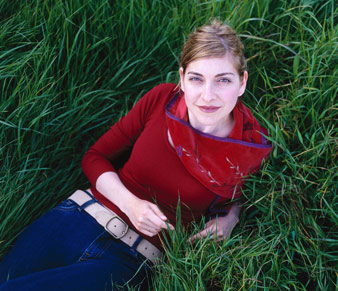 If they don’t talk much, the siblings do communicate: ‘At night Ella and her brother tapped a secret code against the wall that separated their bedrooms’, from one knock – ‘I’m afraid’ – all the way to a stream of knocks, which meant ‘her brother could hear their mother and father crying in their bedroom’. Ella’s mothering of Benjamin is a thread running throughout, ironic now that her own ill mother falls short of providing the attention that Ella craves. There’s a scene that’s set in the bedroom of the house they are visiting, where Ella’s mother goes to lie down, which hints at the gap between how things used to be for Ella and how they are now. Ella rushes in to tell her parents that she’s lost a tooth, really lost it – it’s fallen out and she can’t find it – to find her father doing little shadow hand puppets on the wall to make her mother smile. It’s light relief. Maybe his hands look like they’re praying, too?
If they don’t talk much, the siblings do communicate: ‘At night Ella and her brother tapped a secret code against the wall that separated their bedrooms’, from one knock – ‘I’m afraid’ – all the way to a stream of knocks, which meant ‘her brother could hear their mother and father crying in their bedroom’. Ella’s mothering of Benjamin is a thread running throughout, ironic now that her own ill mother falls short of providing the attention that Ella craves. There’s a scene that’s set in the bedroom of the house they are visiting, where Ella’s mother goes to lie down, which hints at the gap between how things used to be for Ella and how they are now. Ella rushes in to tell her parents that she’s lost a tooth, really lost it – it’s fallen out and she can’t find it – to find her father doing little shadow hand puppets on the wall to make her mother smile. It’s light relief. Maybe his hands look like they’re praying, too?
“No,” he said, and adjusted his hands. “It’s a horsie, see?”
“A horsie?” said Ella’s mother. “With fins?” […]
“Hey”, her mother said. “Come here, you. Smile again.” […]
“You lost your tooth!”
“It’s gone,” Ella said. She climbed onto the bed to explain, but as she flopped down on the mattress her mother’s face contracted with pain.
“Please don’t bounce,” her mother said […]
Ella’s father gave her a stern look and lifted her off the bed. “Your mom’s sleepy. You should run back downstairs now.”
If the stranger’s house (‘the Kaplans’) is a character in this story, it’s Cancer, with a big C. Everything about it yells passive/aggressive, from the crayoned sign in the entrance hall, near the pile of Birkenstocks, saying, ‘SHOES OFF NOW!’, to the tarnished lion’s head doorbell, to the rooms themselves; there is a Meditation room, all strangeness and incense and dinging bells, welcoming with one hand and repelling with the other.
All the guests seem to know the rules, except Ella’s family, and all four of them at some point commit some mild faux pas that would be funny, were it not for the rarefied, provocative air of ‘The House’. At the dinner table, ‘There was a roasted dome of something that looked like meat but wasn’t’ and when Benjamin tried to hide under the table, then ‘began to cry quietly’, his father feels compelled to apologise: “The kids aren’t vegetarian.” Later, in an effort to snap Mr Kaplan out of his quietly repressed anger over an incident he’s just been told about, concerning his son, Ella’s mother says:
“Tell us about your Tai Chi class.”
“What?” he said.
“Your Tai Chi class.”
“You know, I really don’t want to talk right now.” He pushed back his chair and went into the kitchen.
Ella’s father tries to smooth things over: ‘“Does anyone want more rice?” But a man with a shaved head replies, sombrely: “I think we’re all thinking about Lena.”
Lena, as it turns out, is the mother of the house, now dead, from cancer, presumably – though of course no one talks about that and she haunts the story like the other Mrs DeWinter. It’s Ella who accidentally discovers Lena’s daughter’s shrine to her mother:
…a shelf without any books at all […] Burnt down candles stood on either side of a black lacquer box, and on top of the box stood a glass filled with red water.
Ella reached for the glass, and someone behind her screamed.
She turned around. Clarie stood in the doorway, dress unbuttoned at one shoulder, face smeared with mud.
“Don’t touch that,” she said.
Ella took a step back. “I wasn’t going to.”
Clarie’s eyes seemed to ignite as she bent down and took the glass in both hands. She held it near a lamp, so the light shone through it and cast a wavering red oval upon the wall.
“It’s my mother,” she said.
Adulthood reigns on the inside of the house: it’s all rules, etiquette, things repressed and held in perpetual rolling boil, like jam. Outside, there is childhood, raw, unravelling. Mr Kaplan promises Ella and Benjamin that they will love the ‘tree castle out back’ but it turns out to be a frightening space ruled over by dictatorial bully, Peter, the son of the Kaplans. As adults, we might read into Peter’s controlling behaviour the pain of grief from losing his mother pushed angrily outwards, but by making Ella the mouthpiece for the story, Orringer cuts off the possibility for such insight, rendering these scenes excruciating, just like childhood: whose game is this? Who’s in charge? What are the rules? In a line that mimics ‘SHOES OFF NOW!’ the first words shouted at Ella and Benjamin are, “Take off your socks! That’s an order”. And the grotesque, exaggerated reflection out here in the garden, of what happens in there, in the house, is something handled supremely well in this story. Inside, there are ornaments and foreign objects, outside, birds’ skulls, ‘no bigger than walnuts’ hang from one of the rooms that make up the ‘most sophisticated tree house they have ever seen’. Inside, there is the Meditation room, and a tacit understanding that once in it you don’t leave, unless you’re released (Ella’s mother twice sends Ella away when, in the final scene, she tries to deliver some awful news); outside, there’s a Hostage Room (yes, really) in which children are tied up, sometimes, as in Clarie’s case, voluntarily. Outside, Ella is prodded and coerced into jumping from the highest tower, a collie dog barking like crazy somewhere below; inside, her parents bow and scrape at incense, tofu, otherness and fear.
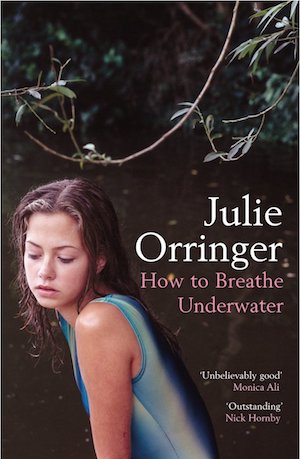 It’s no accident that ‘Pilgrims’ is divided into five parts like a Shakespearean tragedy. The books Ella spots in the hallway are D’Aulaire’s Book of Greek Myths, Grimms’ Fairy Tales and The Riverside Shakespeare. You can stretch the tragedy analogy quite some distance here, without pulling the integrity of the story out of shape. Hamlet is an exploration of, among other things, the burden of duty versus integrity; the ghost of Hamlet’s overbearing father bullies him into submitting to a course of action that is not really him; he is ‘beside himself’, and in this story Cancer has a similar effect on Ella’s parents. It’s as though they don’t recognise themselves. There is suggestible, fearful Benjamin, wanting only to be told what to do, as confused and malleable and ready to believe as the child-like Othello. Then there is the quiet that pervades this story. Ella, the archetypal adult-child, barely speaks, and often you want her to, to scream as loudly as the other children, but what’s the point when she’s always overlooked or ignored? So she says nothing, and ‘nothing will come of nothing’, as a pained King Lear reminds his youngest daughter. It’s the sense of groaning momentum that most obviously draws comparisons with Macbeth, both in terms of the attitude of Ella’s parents, keeping on because they’re too fatigued and frightened to ask for directions, and in relation to the story itself, which does that thing that all good short stories do: it propels itself forward as though powered by and pulled towards inevitability – so that the reader wonders both how could that have happened and, of course, that had to happen. The well-known line from Macbeth is ‘I am in blood/ Stepp’d in so far that, should I wade no more/ Returning were as tedious as go o’er’ – and that’s why Ella’s parents are here in the first place, surely, because what else can they do? It’s why Ella jumps when she’s told to, and why she tells Benjamin, when he wants to go home: “Shh … We can’t.”
It’s no accident that ‘Pilgrims’ is divided into five parts like a Shakespearean tragedy. The books Ella spots in the hallway are D’Aulaire’s Book of Greek Myths, Grimms’ Fairy Tales and The Riverside Shakespeare. You can stretch the tragedy analogy quite some distance here, without pulling the integrity of the story out of shape. Hamlet is an exploration of, among other things, the burden of duty versus integrity; the ghost of Hamlet’s overbearing father bullies him into submitting to a course of action that is not really him; he is ‘beside himself’, and in this story Cancer has a similar effect on Ella’s parents. It’s as though they don’t recognise themselves. There is suggestible, fearful Benjamin, wanting only to be told what to do, as confused and malleable and ready to believe as the child-like Othello. Then there is the quiet that pervades this story. Ella, the archetypal adult-child, barely speaks, and often you want her to, to scream as loudly as the other children, but what’s the point when she’s always overlooked or ignored? So she says nothing, and ‘nothing will come of nothing’, as a pained King Lear reminds his youngest daughter. It’s the sense of groaning momentum that most obviously draws comparisons with Macbeth, both in terms of the attitude of Ella’s parents, keeping on because they’re too fatigued and frightened to ask for directions, and in relation to the story itself, which does that thing that all good short stories do: it propels itself forward as though powered by and pulled towards inevitability – so that the reader wonders both how could that have happened and, of course, that had to happen. The well-known line from Macbeth is ‘I am in blood/ Stepp’d in so far that, should I wade no more/ Returning were as tedious as go o’er’ – and that’s why Ella’s parents are here in the first place, surely, because what else can they do? It’s why Ella jumps when she’s told to, and why she tells Benjamin, when he wants to go home: “Shh … We can’t.”
Of course, if we’re comparing this story structurally and substantially to a Shakespearean tragedy, then we’re anticipating death. Not merely the foreboding presence of death, the Grim Reaper waiting for Ella’s mother (though that is there), but an actual death. And it happens. Act five. It’s shocking and yet we’re not exactly shocked; just what you need from the story and don’t want. Clarie’s older brother, Peter, the troubled bully, already on a warning, takes the glass of red gloop, a.k.a. his and Clarie’s ‘mother’, and disappears up to the top of the tree house with it. You can see the rest happening in slow motion.
He swept the glass in the air […] The water flew out in an arc, ruby-coloured against the glare of the floodlights. Clarie leaned out as if to catch it between her fingers and with a splintering crack she broke through the railing. Her dress fluttered silently as she fell […] Then, with a shock Ella felt in the soles of her feet, Clarie hit the ground.
The children’s reactions afterwards are authentic and therefore disturbing:
“Get some leaves and stuff,” [Peter] said. “We have to cover her.”
Ella would not move. She took Benjamin’s hand but he pulled away from her and wandered across the lawn, pulling up handfuls of grass.
Ella tries to tell her mother, who, mid-meditation, blinks her away. And, some time after, Ella’s family leave. And that’s that. We don’t stick around long enough for a post-mortem. It’s as harrowing as it is satisfying, and the last line is supremely good:
[Ella] closed her eyes and followed the car in her mind down the streets that led to their house, until it seemed that they had driven past their house long ago and were moving to a place where strange beds awaited them, where they would fall asleep thinking of dark forests and wake to the lives of strangers.
~
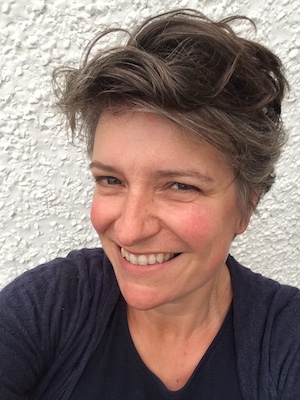 Kate Smith has an MA in English Literature from Cambridge University. Following a stint as a lawyer, she escaped more or less unscathed and now writes all sorts but especially comedy for TV and radio, with a partner. She obtained a distinction for her MA in Creative Writing from MMU, and her debut novel, The Negligents, is due to be published next year.
Kate Smith has an MA in English Literature from Cambridge University. Following a stint as a lawyer, she escaped more or less unscathed and now writes all sorts but especially comedy for TV and radio, with a partner. She obtained a distinction for her MA in Creative Writing from MMU, and her debut novel, The Negligents, is due to be published next year.
~
photo of Julie Orringer © Stephanie Rausser
